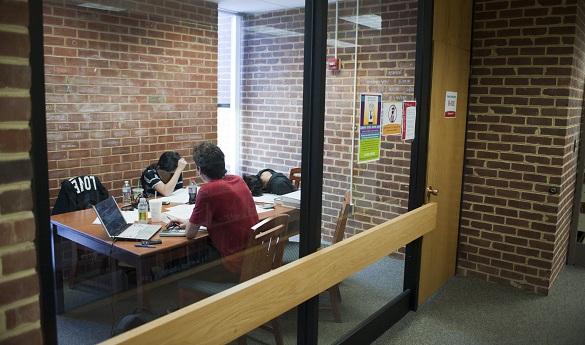University Libraries launches study room reservation software
As students prepare for final exams, a familiar quandary among them is where to study. To ease this anxiety, and motivated to address policy following a dispute last spring, University Libraries debuted online software last month which enables students to reserve group study rooms on any of Mason’s three campuses.
With the new reservation software, Mason students, faculty and staff can reserve space for two to four people in group study rooms up to 14 days in advance. The rooms can be reserved for up to four hours per day.
Dot Lockaby, head of university libraries access services, said the software launch in April was timely, before the start of finals.
“We wanted to get it rolled out before final exams,” said Loackaby. “Students don’t need any more stress at that time of the year.”
The need to address policy regarding study room usage became apparent last spring when a dispute between two Mason students over rights to a Fenwick Library study room led to the arrest of one of the students, then-senior Abdirashid Dahir, on abduction charges. Those charges were eventually dropped following student-led protests and a university investigation into the incident.
In the wake of the incident involving Dahir, a Presidential Task Force was created to examine the interactions and experiences of Mason community members and the Mason Police.
According to Lockaby, University Libraries had been looking at different software possibilities for a couple years, but she said the events last spring did hasten the process.
“That incident was the type of thing you hope not to have happen,” said Dot Lockaby. “When it happened, it reinforced our commitment to get [the reservation system] done.”
The reservation software can be accessed on the University Libraries website. Once accessed, rooms can be reserved in any of the four university libraries: Fenwick Library, Johnson Center Library, Arlington Campus Library, or Mercer Library on the Prince William campus. The four buildings hold a combined 79 group study rooms.
After making their reservation, students are recommended to print the confirmation receipt and bring it with them to campus. Lockaby said this step enables students to offer quick proof of their reservation if another student is occupying the room when they arrive.
“The printed reservation makes it much more clear and I think people perceive the system as much more fair,” said Lockaby. “People have been supportive so far.”
Policy stipulates that reservations for the enclosed group study rooms must be made by an individual on behalf of a pre-selected group of two to four people. An individual can’t hold a room while waiting for others in a group and a reservation is forfeited if the room is not occupied by two or more students within 15 minutes of the start of the reservation.
“I think it’s fair,” said freshman Zach Fowler. “With the new system, people have opportunities to study and everyone has a chance.”
Fowler said he doesn’t often use library group study rooms but that the next time he does he’ll try and make a reservation to avoid not having a room.
Lockaby said creating a more “fair and open process” for students to reserve study space isn’t a concern specific to Mason and that other university libraries have been moving towards a reservation system as well. She cited VCU as another Virginia institution that recently created a similar system.
“We’re all, as a profession, thinking the same about the issue.”

